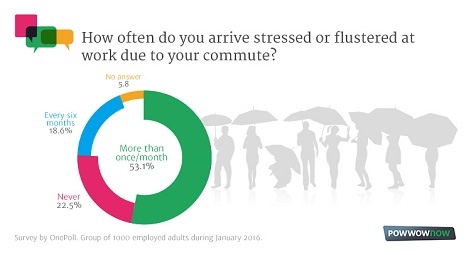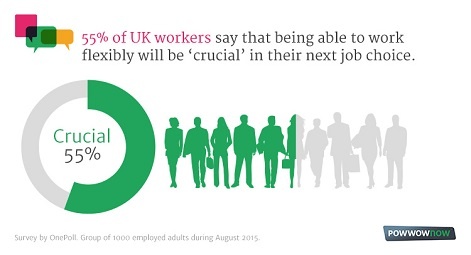How VR/AR will take business and enterprise from video calling into the future of colleague collaboration and information access, according to Chris Martin, CTO of Powwownow.
For some business leaders, it may seem outlandish to imagine that their employees will be using VR to keep in touch with colleagues and AR when making board presentations in the next five to ten years, but that isn’t as far-fetched as it seems.
VR’s already widely used by companies all over the world, from enabling teams to collaborate and work more efficiently to generating new, creative approaches for achieving business objectives. The benefits that VR - and to a lesser extent at this stage, AR - are currently bringing to enterprise are huge. Both are developing at an extraordinary rate, and the potential that they present for employees and businesses is incredibly exciting.
VR should be viewed by forward-thinking business leaders as one of the most essential tools for collaboration today.
Enabling Collaboration In Today’s Workplace
VR should be viewed by forward-thinking business leaders as one of the most essential tools for collaboration today. Conference lines and newer technologies such as iMeet, which enables you to share your computer screen with other colleagues remotely, are becoming standard tools in everyday offices. However, these are in themselves early examples of VR in office action.
Rather than needing all team members to be together in the same location, VR enables colleagues to collaborate and communicate face-to-face anytime, anywhere. This removes many barriers that stand in the way of teams working to their optimum efficiency, which ultimately means that a business’ bottom line is less likely to be jeopardised.
The very essence of VR, and the driving force behind its impact on enterprise, is about bringing people together to collaborate. From picking up the phone to make a conference call to using an app to share documents securely, it’s the level of interaction through these collaborative technologies which is already helping businesses increase efficiency. In this way, we can already see the benefit that VR is bringing enterprise.

This could be the catalyst that allows you to get competitive advantage.
Incorporating AR And VR Into Enterprise
At the moment, most people think of the VR and AR headsets, like Oculus Rift or the Snap Glasses, as a novelty; transporting a lucky few to the outer galaxy and helping influencers add to their Snapchat story with greater ease. But where these headsets will add real value is in enterprise.
Presentations today can be a dry affair and not all of the information participants need is always available at the time of the presentation. But imagine if you were wearing AR glasses - or contact lenses - that could bring up additional supporting information that only you can see when you look at the presentation. This could be the catalyst that allows you to make better informed decisions to move faster and get competitive advantage - and this is where AR could take us in the next five years!
In industries which require huge amounts of technical knowledge, AR will really come in to its own.
Tech Specs
In industries which require huge amounts of technical knowledge, AR will really come in to its own and provide essential support in some cases. Imagine a real-life example where a police bomb disposal unit is deployed to neutralise a suspicious package in a busy city. As the officer approaches the package, the headset could flash up relevant and potentially lifesaving information such as temperature levels, chemical analysis and even information on how to neutralise that specific type of bomb. This service will not only be extremely beneficial to the policeman on the scene, but it will also help the police in terms of improving their efficiency in dealing with such scenarios.
We will see significant advances in VR/AR's adoption and sophistication over the next few years.
Proper Property
Whilst we are already using VR in the workplace, we will see significant advances in its adoption and sophistication over the next few years. One industry where use of VR is already being utilised is in property. As agents and landlords move their services to online platforms, some have started to incorporate VR into their platforms to attract the modern renter and home buyer. Consumers are time-strapped and have limited time to visit properties whilst hunting for their next home. Through using VR, estate agents could show prospective buyers or renters ‘virtual’ live tours of properties, meaning the consumer never has to leave their sofa to view a property. This will streamline the property industry which could enable more transactions to take place, meaning the consumer gets a new home with greater ease and the agent’s bottom line is improved.

Digital Transformation
There has been an overwhelming level of digital transformation that has taken place since the turn of the 21th century. Whilst VR has already embedded itself into the everyday office in a small sense, there is still so much more that this technology has to offer. With AR, we have yet to see the real impact that it will have on enterprise, but this is certainly set to change soon. The opportunities that VR and AR present for the future of business are exciting, not only in terms of enabling teams to achieve greater things than before, but also in bringing people together in greater collaboration.
About The Author
As CTO at Powwownow, Chris drives forward technology innovation to bring customers easy-to-use products that allow better team and group collaboration, whilst building a scalable platform to support ambitious business growth plans. Prior to his role at Powwownow, Chris was CTO at Cheapflights Media, responsible for architecting, building and supporting the technology platform to satisfy over 140 million global annual visits, and the gathering of millions of daily travel deals.













